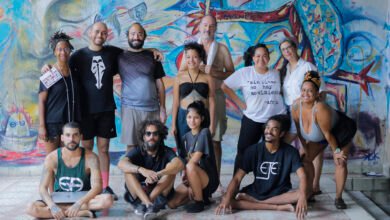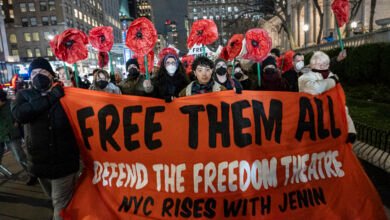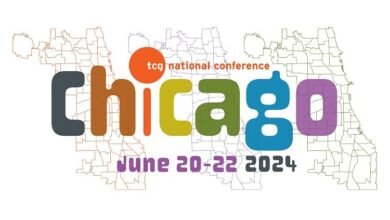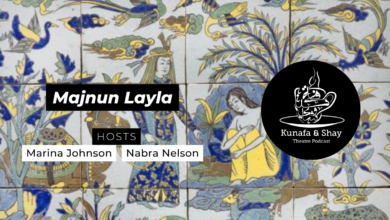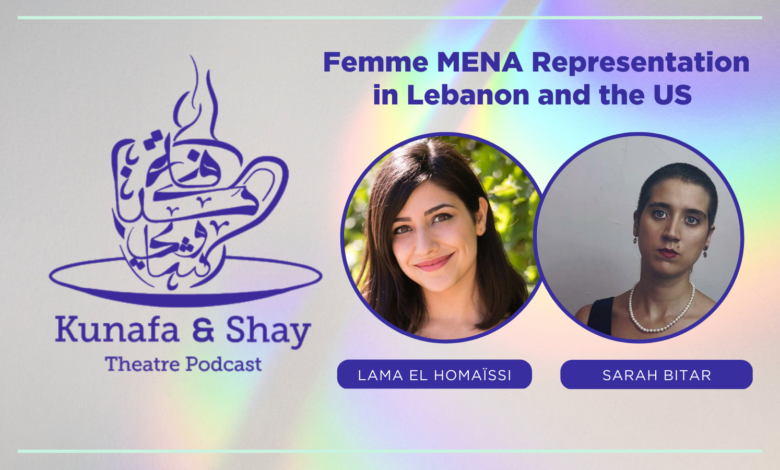
Marina: And just to touch on what you just said, thank you for giving such an overview, because it’s so important. And we’ve talked before on the podcast about how there’s often a burden on MENA or on SWANA folks to write stories that then are really either palatable or have a lot of explanation to white audiences, and so it’s refreshing to have these moments of, “No, this is just the story.” And Adam also talked on this season about how sometimes it’s okay just that it’s not written for you, and you’ll still get a lot out of it even if you’re not the target audience of it. So I love hearing that, too.
Lama: I wanted to add something, too, that Sarah and I always talk about, is, we were comparing how adapting to the New York theatre scene or how it feels to be in the New York theatre scene, versus the Beirut scene. And I think one big thing to make distinct and clear is that, you know how there’s sort of a production or money-making machine, or even the way we start to think about putting something on its feet, there’s a lot of focus on financial investment and producers and backing, and sometimes it may affect what gets produced or why we’re telling the story today or all those things. In Lebanon, it’s a lot of self-production, or you’ll get a grant from an organization like AFAC or Mophradat, and then figure out the rest yourself. You can walk away actually with losses, but you’re paying a hundred dollars to each of your friends just for being able to do it for two weeks.
You personally walk up to the theatre space yourself, and you go, “Do you have time on this calendar?” And you’re talking to one other person, and you’re figuring out… I don’t know if this is the case for everybody, but I feel like it doesn’t feel gatekeep-y when you are… Maybe a downside is that we don’t get, there isn’t support from the government, or not sufficient. There aren’t really these big producer types that are funneling money into this, because it’s not a way that we’ve been making profit from tourism in Lebanon.
So there’s focus on other things. There’s promoters bringing big acts to concerts and things like that. That’s definitely present in that way. But where I was going with that is that, as a playwright and as a creator, you’re thinking a lot less about product and money and audience, and you’re thinking more about core, and you’re thinking about what is it that’s itching you so much that you have to say it right now, or as my father says, he’s like, “I’m pregnant, and I have to give birth to this thing even though it’s not financially a good idea right now.” So what will push you to that point where you’re going to suffer a loss, but you really… Why are we still making theatre? There’s a reason.
And then the other thing I wanted to say is, Sarah and I are similar in age. Hope that’s okay to say. But I was born in 1991, which was the first year out of our Civil War, which had begun in 1975. So we also are born out of a time where there are big… Thematically, a lot of things I’ve noticed in the narratives from pre-Civil War to during the Civil War and post-Civil War, they’re very different. We definitely grew up sort of reckoning with this idea that our country had just gone through that and that there was just an acceptance that things were being rebuilt and that, economically speaking, it was in a specific state after such a long Civil War.
Then, as well as thematically, I grew up with a lot of retellings of the Civil War. And our experience, I feel like I didn’t start to unpack or talk about it in my practice, because there’s so much space given to this Civil War in the public conscience, and it’s so present that I feel like I didn’t begin to unpack everything until I was way older.
And then in terms of the plays that we watch, I think another thing Sarah and I always talk about is, it’s so different than Western theatre, I think, because there isn’t the threat of needing to sell a product and make money, there is more experimental theatre. I think that alleviates a lot of the freedom that an artist can have. There’s a lot of experimental theatre. Before Ziad Rahbani began writing his musicals, his father’s, a lot of the themes were of kind of a perfect village. What are the societal norms? You’ve got your bad guy, you’ve got your hero, the love interest, and a chorus of an ensemble of these villagers singing back. What are these societal norms? Like, “Oh no, she spoke to someone without the presence of her father.” So reinforcing an ideal utopic time, nostalgic for an era of Lebanon.
And then when Ziad began composing and writing his plays, you could definitely see a shift as we were now in the Civil War. I think of Bennesbeh Labokra Chou, which is one of his musicals. It’s set entirely in a bar, and it’s about these patrons that come and go. And they’re singing about the situation, they’re singing about living day to day, trying to make it. And then the question that it’s asking is sort of, what this desperation is going to push this bar owner to do in his personal life, without giving away the ending. But you’re definitely going from a bigger utopic, “these are the village ideals,” to a more gritty, realistic, not really beautiful image.Marina: I just really appreciate the context that you’ve given to Lebanese theatre. We’ve had Zeina Daccache talk about some Lebanese theatre, and Sahar Assaf, and so we’ve had some dips into really thinking about theatre in Lebanon from different perspectives, but I feel like you gave a really concise overview really quickly. So thank you for that. I think that’s a huge benefit to all of us to get to hear.
I definitely want to head into the music direction in a minute, but I also just want to think of some of the things that you brought up about how, in your lifetimes, the context of theatre has changed, the stories, that theatre telling has changed. And I also just, I think, want to tie that into what we all bring to our art. Because we bring our identities, but you also have… You’ve lived in Lebanon, you’re living in the States, so you’re bringing all of this context with you to the art that you’re making now, with MENA identities, with femme identities, with queer identities. These things all play into… Sarah, you were talking about how you’ve become more selective over time with roles, and that’s also part of an identity that’s becoming either more confident or more comfortable, or just, “I’m in my thirties, I don’t want to do this anymore,” the other kinds of gigs. But I would love to talk about the ways that your identity play into the art that you’re making or even the conversations that you want to have.
Sarah: Wow. While you were talking, I was like, “I don’t know, maybe you and I should get together and build a course here in the US about theatre or something.”
Marina: I would be the first student, promise. That would be amazing.
Sarah: Okay. I’m going to start with, I’m a bit of a rebel against identity art in a way, or the way in which the theatre is heading right now. I’m more of a committer to a good story, no matter who are the people in it. And it took me some time, arriving here, being a foreigner, existing as a foreigner in this space, having to go through visa stuff and still going through visa stuff, and expressing myself in, not a second, but a third language, and also being from this very complicated place that is so difficult to sum up. And also it’s a very faraway place geographically, and people tend to be very, very ignorant about, like, “Oh, Lebanon, what is that?” And it’s fine. It’s fine. Like, “Okay, cool. Yeah. It’s a very tiny country and two oceans and a continent away.”
Right now, I’m working on producing, for example, a play by Sarah Kane. It’s called, Cleansed. I’m putting it up hopefully with a… Of course, I’m going to say “hopefully.” That’s a very Lebanese thing to say. Inshallah.
Lama: Inshallah.
Nabra: Inshallah.
Marina: Inshallah.
Sarah: People don’t get it when I say “hopefully.” They’re like, “What do you mean?” It’s just getting a buy-in from the power up there in the sky somewhere.
Back to Cleansed. It’s a very feminist… If we want to give it that label. I really have trouble with labels. But it’s a story of this woman who arrives in an institution for undesirables, and there she meets the person in charge who is the biggest abuser and who allegedly killed her brother. And she’s there slowly transforming into the body of her brother. And so there’s that transition, and, without sticking those labels on it, it’s a trans play. It’s questioning power and the voices, the violent voices that we internalize, and how we relinquish our power when we believe that there’s something wrong with us and seeking help and giving power, seeking help from another person and how they can abuse that power. So it’s very relevant and very dark, and there’s a lot of brutal moments in the play. And so that’s something I’m curious about.
I recently auditioned for a very interesting role for a feature film, literally last week, written by a Lebanese American. And it’s the first script that I actually read that is just taking a stab at the rich Lebanese people. And the character is raised as a princess, and her family is not respecting essentially her kind of refugee husband-to-be who is also a doctor. But she gives him an advice to assert his dominance by actually refusing to open the door or doing the things that her mother shouts at him, which I find very funny, with the undertones of Triangle of Sadness and Parasite. Those were the reference for the film. And I thought that was pretty fun, and those kinds of stories excite me. Because it’s like, the one role I auditioned for before that, that Lama refused to audition for, was, it’s like a rewriting of The Odyssey that was all refugee characters, and again, “The woe is me, the woe is me.”
And I was like, “Okay, it’s an Off-Broadway show. I’ll get paid, whatever. I’ll travel.” I’m justifying every single reason as to why I should audition. “I’ll practice acting, blah, blah, blah.” And then I get there, and the casting director is white, the woman who wrote it is white, the director is white. All the four characters are not American. I don’t know why. I don’t know why. I don’t know what… And it’s fine. I’m not saying that American people can’t write about non-American characters, that’s not it. But it’s so ignorant, and it tokenizes those characters that have turned into, in a way, archetypes, in this part. And it’s boring. It’s boring. I don’t want to be in another war. I’m recovering. And I also don’t have the emotional bandwidth to even be in a play that is about that. It does something to me, especially when it’s treated in this very sincere, dumb, uncritical way, where, again, there’s no story craft. It’s not a universal story.
Because I can see how war is appealing as a narrative. There’s a battle, and there’s someone who wins, I don’t know, and there’s destruction. Maybe there’s something appealing about that. It’s exciting. We all stop to look at a car burning. But there’s another kind of narrative, that… I read this beautiful essay by Ursula K. Le Guin a couple of weeks ago, about stories as carriers and the shift that we need to make from the hunter’s kind of narrative, of, “And he twisted his spear into the mammoth, and the blood spurted it onto his face,” to another kind of narrative, she says, with beginnings that have no endings and stories that have more tricks than conflicts. She talks about stories as a connective endeavor, where there’s no hero that saves or hunts or whatever, but it’s a web that is being put together by so many different people.
Sorry, and the last thing I’m going to say on that is that I thought that the Pakistani film, Joyland by Saim Sadiq, that had many awards and I think a lot of visibility, which I’m very excited about, really achieved that beautifully. There was the father and the son and the wife and the sister-in-law, and all of their struggles and how they affected each other, and there’s no protagonist. They’re all creating this story together. And it was very impressive to see how that could be achieved. And that’s a movie, so if people would like to…
Nabra: And Lama, I felt like a lot of things were sparking for you while Sarah was sharing. I saw you taking notes. I love it.
Lama: Oh, yeah. I have a very expressive face. I wanted to say that the whole thing that took us to Lebanese theatre was Sarah mentioning my dad, and then I completely forgot to talk about him. So basically, we were talking about Lebanese theatre and how there’s a lot of self-production, or not a lot of institutional backing, support, or governmental. And I grew up in a theatremaking household because of my dad.
So my father is Faek El Homaïssi. He started out as a pantomime, but it definitely transformed into experimental theatre using pantomime, rather than the way that you would imagine it classically. He studied in France and then moved back to Lebanon. And growing up, I was behind the scenes of a lot of the plays and children’s musicals that my father worked on. One of them was Kello Men El Zayba’, and many others to come. And it was a family affair. My dad would be the creator and performer. My mom’s a painter in fine arts, so she would do the posters, sometimes puppets, whatever masks were required. And then my brother and I would just do ushering. Day of, we’d just be there. And then as I grew older, I got into stage makeup, and I started doing my father’s face, which was really special and also kind of scary, just seeing him needing to focus in those final moments, and I’m just like, “Wait, hold on.” He’s like, “Please, please, I must go now.”
So definitely being a father working with your teenage kid doing your makeup was an experience for him as well. But I definitely saw how every feat began and ended for every one of his productions. So I got to see a lot of the beginnings and behind the scenes of doing all that. And he was also in Bil Nesbe la Boukra Shoo by Ziad Rahbani. He was in that musical that I was talking about.
Sarah: He’s amazing. And he’s a long, long life educator. I studied with him, and he still teaches, I think, at the Lebanese University where I did my undergrad. But he taught, I don’t know, for forty years or something.
I feel like if it were up to us, we wouldn’t choose to re-experience and re-traumatize ourselves every single time we make theatre.
Lama: He’s a drama professor. Yeah. Yeah, he has definitely had a long life and career in theatre and culture work in Lebanon and the Middle East in general. And I feel very, very lucky to have grown up around that and with that.
And now I wanted to also touch upon, we were talking about these intersections of identities. I feel like for me, when you’re in Lebanon, everybody has gone through the same thing, and we’re just all maybe expressing that in our work or speaking about things that have nothing to do with what we’ve experienced. And you’re presenting it to an audience of predominantly other Lebanese people. And so there’s a lot less of contextualizing that you have to do or educating that you have to do. And when it comes to anticipating your audience, it’s a whole different ball game than it is for me here.
I noticed that after immigrating, it was something I had never really thought about, but just how much I would be affected as a writer, how much thinking I would do about, “Oh, okay.” But I kind of have to take a step back, and I have to start my story a little bit behind so I can contextualize. Or I’m using a first generation Lebanese American who’s kind of parachuting going to Beirut on a journey of her own to try and detangle her identity. But I feel like I only started to think about these theatric modes and methods in writing to help an American audience. I’m not saying anything… I’m just saying that maybe they’re very unfamiliar with certain things, or potentially certain beliefs they have about the Middle East are either incorrect or might be true for Northern Africa, but not really for the Levantine region. So I definitely noticed that I am more mindful of my identity because I’m having to spell it out as well.
And then the way I feel is that also I’ve just auditioned for a lot of women in distress, a lot of parts of women who are either offstage, they appear for a little bit, they’re in distress, they’re not part of the main story, they’re sort of just there as an instrument. The main character might be an Arab cis male, hetero, whatever, but we’re just kind of part of the background. And I don’t want to say that it’s always intentionally harmful. I think sometimes it’s a way of letting the audience member go, “Oh, have sympathy.” You should have sympathy for these women but at the same time, that kind of victim box can take away so much from femme agency, or just any kind of…
And then we talk about this in the US in the context of a Bechdel Test. It’s kind of similar, but then adding also a lot to it of stereotypes about Arabs, or people just assuming that, in order for them to make Middle Eastern theatre, you don’t need creatives on the inside of it. That’s the side I was saying, is, you can just really tell before you even show up to the audition what kind of situation it is, because there’s a certain tokenization in the language or even just the topic. I feel like if it were up to us, we wouldn’t choose to re-experience and re-traumatize ourselves every single time we make theatre. But it’s also an important thing to talk about. But if it’s coming from a Middle Eastern creative who wants to talk about the War, it is also different than someone American who’s Caucasian and wants to talk about the War.
Sarah: We don’t write plays, habibti, we don’t produce plays, we just write comments.

